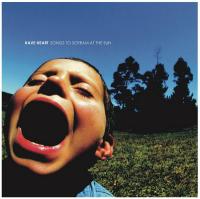
Have Heart
Songs to Scream at the Sun (2008)
Brian Shultz
Despite the apparent influence of straight-edge predecessors like Bane, What Feeds the Fire and In My Eyes, Have Heart never quite sounded exactly like their influences. Their early sound eventually morphed into the well-received, youth crew revival-inspired What Counts EP and the followup, the mammoth and more varied The Things We Carry. What's completely unprecedented is how much Songs to Scream at the Sun doesn't sound like the logical progression of all these years leading formidably furious live shows and coarse, fine songwriting, yet how rigorously fluid and intelligent it is despite its inherent similarities and rigid familiarity.
For starters, Songs to Scream at the Sun sounds like a pure Deathwish, Inc. release, as it was engineered by Kurt Ballou and mostly recorded at God City Studios, giving it the hollowed, gritty sound once never expected of Have Heart. Through these sonic qualities and an even greater embrace of the teeth-clenched, mid-tempo march, Have Heart sound an awful lot like Modern Life Is War. But why is this permissible? Because none of MLIW's close followers in the last few years have quite the unique take on melody and pacing like Have Heart have, nor the poetic lyrical quality in a candid and charismatic frontman like Patrick Flynn.
Songs to Scream at the Sun leaves behind nearly all the cliché hardcore topics broached by Have Heart in the past, with only the touring ode "Pave Paradise" topically tackling a typical trench. Otherwise, Flynn's mind is clearly fixated on using family as a metaphor for everything -- the proverbial chemistry of domesticity lays the ground for half the songs on the record. However, he's also looking to the beauty and frailty of nature; Flynn seems to flip like a switch between the 'sun' (as he did for "Watch Me Sink" and "Watch Me Rise" on The Things We Carry) and acknowledged 'son.'
There's the absolutely flawless "Bostons," where Flynn trades off with fellow would-be poet, Shipwreck A.D.'s J.D., barking lines about how "sometimes a man breaks" and "sometimes he can't bend," leading to an invigorating, building bridge that begins to hit detonation point with Flynn announcing "[so] I could be the boy you couldn't be" and an unraveling, mind-shattering, catchy explosion to finish. Other standouts include the slow-churning "Brotherly Love," where Verse's Sean Murphy assists, and the melodic hardcore bite of "No Roses, No Skies," where punctual gang vocals are perfectly punched in between Flynn's motivational speech to a female character embattled by the mainstream media's unreachable portrayal of beauty -- a familiar matter, sure, but one whose struggle is made both stark and endearing by Flynn's prose.
At an incredibly brisk 21 minutes, Songs to Scream at the Sun blows by the inattentive like a runaway freight train without its crossing gate ever lowering, but basking in its dim lyrical glow and focusing on its breathless thrust is an experience to behold.
The yawning post-metal guitars of the mostly instrumental "Reflections" seem to provide a breather much in the same way "Old Man II (Last Words and Lessons Learned)" did for The Things We Carry, while Flynn proclaiming "arise, my soul and sing" to the repetitive close of the last track, "The Same Sun" is an obvious counterpart to "Watch Me Rise"'s "I'd rather die on my feet / than live on my knees" climax. Neither of these seem to match up to their predecessors, but they're definitely great moments.
That's the thing: Songs to Scream at the Sun seems to come just short of absolute brilliance. Have Heart is capable of creating a work so stunning it turns the hardcore world on its head, and while they seemingly already did that with The Things We Carry, one senses there are greater things on the horizon -- no pun intended -- if the band are able to keep it together longer than so many of their peers and past heroes. In any event, Songs to Scream at the Sun is a nonetheless wonderful achievement and heartily recommended for those wishing to witness heavy music progress into narratives that focus on telling intricate, idyllic stories through poundingly rhythmic exorcises.